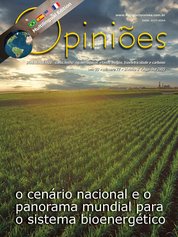Luiz Augusto Resende Nascimento
Cerradinho Bioenergia
OpAA77
Análise dos avanços e oportunidades do setor sucroenergético
O setor sucroenergético brasileiro desempenha um papel crucial para a economia nacional, sendo um dos maiores produtores e exportadores de açúcar e etanol do mundo. Ao longo das últimas décadas, esta indústria passou por diversas evoluções, impulsionadas por fatores socioeconômicos, tecnológicos e ambientais.
O setor enfrentou uma série de desafios que moldaram o seu avanço. Entre eles destacam-se: a flutuação dos preços internacionais, a busca por sustentabilidade, a renovação e expansão dos canaviais. Contudo, o setor sucroenergético passou por notáveis evoluções no setor produtivo industrial, que contribuíram para impulsionar a sua competitividade e eficiência. Cito as principais, segundo meu ponto de vista.
• Tecnologia e digitalização: a indústria sucroenergética tem adotado cada vez mais tecnologias avançadas, como a Internet das Coisas (IoT), a automação, a inteligência artificial e a análise de dados. Todas elas permitem o monitoramento em tempo real dos processos industriais, otimizando a produção, reduzindo desperdícios e facilitando a tomada de decisões, baseadas em dados precisos.
• Agricultura de precisão: uma prática que utiliza tecnologias para monitorar e gerenciar as plantações de forma individualizada, levando em conta as características específicas de cada área do canavial. Alguns exemplos: o mapeamento e o sensoriamento remoto (uso de drones, satélites e sensores), monitoramento em tempo real, aplicação de insumos variáveis, gerenciamento de frota agrícola, tomada de decisões baseadas em dados, integração e conectividade, entre outros. Isso resulta em um uso mais eficiente dos insumos agrícolas, como fertilizantes e defensivos, reduzindo os custos de produção e os impactos ambientais, além do aumento de produtividade (melhor manejo).
• Biotecnologia e melhoramento genético: a pesquisa em biotecnologia tem sido fundamental para o desenvolvimento de variedades de cana-de-açúcar mais produtivas e resistentes às doenças. Já o melhoramento genético permite obter plantas com características específicas desejadas, como as com maior teor de sacarose ou maior resistência às pragas e doenças, com melhor adaptação aos diferentes microclimas existentes em nosso país.
• Sustentabilidade e certificações: a adoção de práticas sustentáveis é outro aspecto fundamental para o futuro do setor. A sociedade está cada vez mais preocupada com o planeta e os consumidores e investidores almejam produtos manufaturados, de forma responsável e sustentável. Nesse contexto, muitas usinas têm buscado certificações que atestem suas melhores práticas, como a Bonsucro e a ISO 14001. Além disso, a produção de etanol avançado, a cogeração de energia a partir do bagaço da cana e, mais recentemente, a produção de biogás aproveitando a vinhaça, são exemplos de práticas sustentáveis adotadas pelo setor. Outro ponto importante é a gestão adequada dos recursos naturais, com a expansão dos canaviais sendo feita respeitando as normas ambientais, garantindo a proteção das florestas e, consequentemente, dos recursos hídricos. A implementação de práticas de conservação do solo e o uso eficiente da água são medidas que também garantem a sustentabilidade da produção;
• Diversificação de produtos: a indústria deve continuar a diversificação da oferta de produtos para além do açúcar e etanol. Esse último tem sido uma importante alternativa ao uso de combustíveis fósseis, contribuindo para a redução das emissões de gases de efeito estufa e para a mitigação das mudanças climáticas. Sendo assim, seguir investindo em novas oportunidades, como bioplásticos, bioquímicos e outros produtos de valor agregado, tem se mostrado uma estratégia importante para ampliar as fontes de receita e reduzir a dependência dos mercados de commodities e de mercados regulados, como o de combustíveis no Brasil. Nesse mesmo contexto, também destaco o avanço do etanol de milho que, além de ter várias sinergias com o sistema produtivo atual, também permite a entrada em outros mercados, como o de nutrição animal e humana.
• Logística e eficiência energética: a busca por mais eficiência na logística tem sido uma preocupação constante. Investimentos em melhorias na infraestrutura de transporte e armazenamento têm impacto direto nos custos e na competitividade do setor. Além disso, a adoção de práticas de eficiência energética nas usinas contribui para a redução dos custos operacionais e para a sustentabilidade do setor. Usinas autossuficientes em energia podem obter vantagens competitivas e contribuir para a diversificação da matriz energética do país.
• Economia circular: o conceito de economia circular tem ganhado espaço na indústria sucroenergética. A utilização de resíduos e subprodutos do processo produtivo como matéria-prima para outras indústrias ou para a produção de energia reforça a visão de um sistema mais sustentável e com menos desperdício. Além disso, o reuso da água, a logística reversa e o compartilhamento de recursos entre usinas são outras aplicações que reforçam os princípios fundamentais da economia circular.
• Investimentos em P&D e em pessoas: a busca contínua por inovação e o investimento em pesquisa e desenvolvimento são fatores-chave para a manutenção da competitividade do setor. A indústria tem se esforçado para estar na vanguarda das tecnologias e das práticas mais avançadas, garantindo sua relevância no cenário global. Por fim, a educação e a formação de profissionais qualificados são importantes para garantir a continuidade da evolução do setor. Investir em programas de capacitação e treinamento para os colaboradores é uma maneira assertiva de aumentar a eficiência e a produtividade das usinas, além de preparar a indústria para os desafios e oportunidades futuros.
Com uma abordagem estratégica e uma visão de longo prazo, o setor sucroenergético brasileiro pode se manter como um dos principais players do mercado global, contribuindo para o desenvolvimento econômico do país, a geração de empregos e a redução do impacto ambiental. Cabe às empresas, ao governo e a todos os atores envolvidos na cadeia produtiva, trabalhar em conjunto para enfrentar os desafios e aproveitar as oportunidades que se apresentam rumo a um futuro sustentável e próspero para o setor sucroenergético brasileiro.




